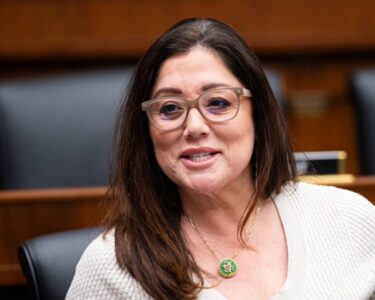TikTok has launched a $2.1 million advertising campaign with a clear message for senators in tough reelection fights this year: Block the House bill that could effectively ban the app in the United States.
“Think about the 5 million small business owners that rely on TikTok to provide for their families,” one purported TikTok user says in the ad. “To see all of that disappear would be so sad,” says another apparent user.
The company has reserved television ad space in the battleground states of Nevada, Montana, Wisconsin, Pennsylvania and Ohio, according to data from AdImpact.
All five states are represented by vulnerable Senate Democrats, each of whom is running for another six-year term.
Other states that will see the new TikTok ads include New York, Massachusetts and Minnesota, according to the ad buy data.
The Big Apple and Beantown are key ad markets for reaching young people and journalists. Minnesota is the home state of Democratic Sen. Amy Klobuchar, one of TikTok’s fiercest critics in Congress. Klobuchar is also up for reelection this year.
The ads started running on Wednesday, with the buy set to end end either April 14 or April 28, depending on where the spots are airing, according to the data.
One of the new ads obtained by CNBC purports to show TikTok users warning their target audiences of how much would be lost if TikTok were banned.
“It’s gonna affect a lot of people’s livelihoods,” says a sad-looking woman.
Despite the hyperbole from TikTok, the legislation passed the House wasn’t an outright ban. Instead, it requires TikTok’s China-based parent company, ByteDance, to divest the app from its holdings within about six months of the bill being signed into law.
If ByteDance fails to do so, then TikTok would not be available to download on the Apple App store and the Google Play store, all but ensuring a slow death for the app among U.S. users.
A spokesman for TikTok said House members hurried the bill’s passage and argued lawmakers who supported the legislation have described it as a “ban” on the app.
“This bill was rushed through the House exactly because its authors know it would ultimately result in a ban,” a company spokesman explained. “Many of the bill’s biggest cheerleaders in the House have publicly described this legislation as a ‘ban’ bill.”
Yet despite having passed the House by a vote of 352 to 65, the TikTok bill still faces an uncertain path through the Senate.
Senate Majority Leader Chuck Schumer, D-N.Y., recently said senators would need time to “review the legislation” before he could share any timelines for potential passage.
President Joe Biden has said he would sign the bill if if passes the Senate. Intelligence community officials recently delivered a classified briefing on TikTok to senators.
Following the briefing, Commerce Committee chair Sen. Maria Cantwell, D-Wash., said her panel might need to hold a public hearing on the bill.
A spokesman for TikTok said the ads are a way to show how the federal government could hurt small businesses if the bill passes the Senate.
“We think the public at-large should know that the government is attempting to trample the free speech rights of 170 million Americans and devastate 7 million small businesses nationwide,” a TikTok spokesman explained.
The company said the buy will be larger than the $2.1 million AdImpact originally tracked, and that a majority of the investment will focus on national, as well as local, television advertisements.
The ads represent the latest effort by TikTok to make a dent in the Washington debate over whether ByteDance could protect U.S. TikTok users’ personal data from China’s autocratic Communist government.
TikTok users have swamped congressional offices with calls demanding that members vote against the ban. The number of these calls soared after TikTok encouraged their users through the app to demand lawmakers not pass the House bill.
Sen. Thom Tillis, R-N.C. shared a threatening voicemail at his office in relation to a possible TikTok ban. Tillis’ office has said it’s received at least 1,000 calls about the app since the House passed their bill.






